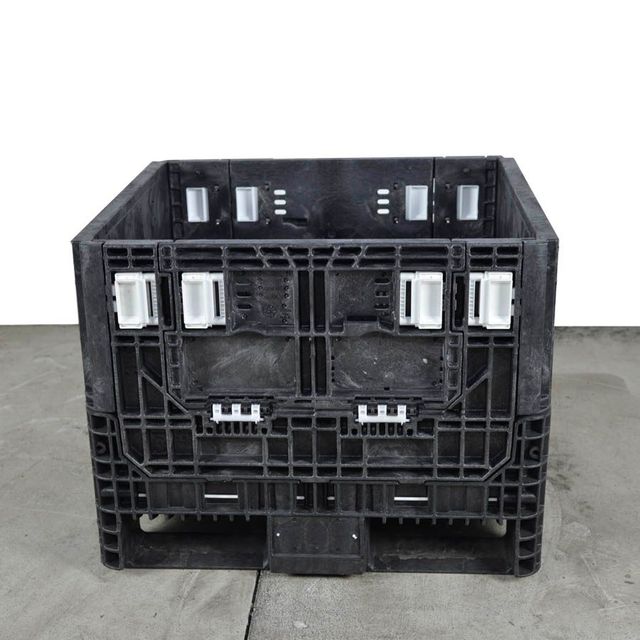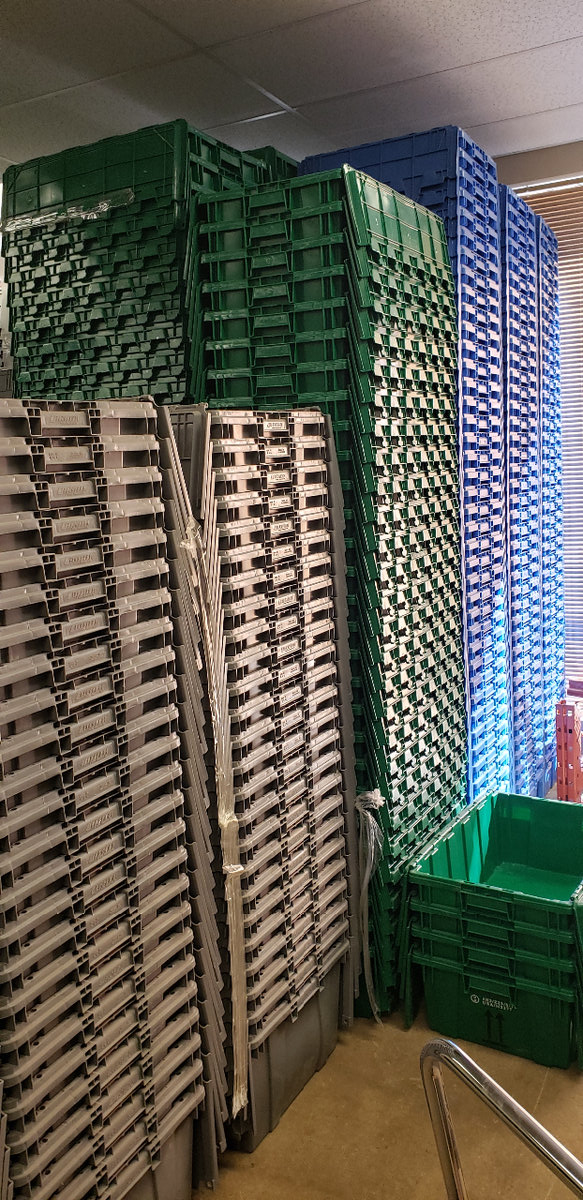How used bulk containers improve storage efficiency across industries
Wiki Article
The Ultimate Guide to Selecting the Right Mass Containers for Your Company Requirements
Selecting the proper bulk containers is critical for any kind of company that counts on reliable logistics. Numerous kinds of containers exist, each created for particular products and applications. Elements such as size, product compatibility, and regulatory criteria play a substantial duty in this decision-making procedure. Comprehending these components can cause boosted functional efficiency. Several organizations overlook essential facets that might boost their general effectiveness and sustainability. What are these considerations?Understanding Various Kinds Of Mass Containers
Bulk containers serve as crucial devices for companies looking for effective storage and transport solutions. These containers can be found in numerous types, each created to satisfy particular functional requirements. One typical type is the intermediate bulk container (IBC), which is ideal for granulated and fluid products, supplying a balance of capacity and ability to move. An additional preferred choice is the mass bag, or FIBC, ideal for dry, flowable products. These versatile containers are lightweight and can be conveniently transferred and kept. For much heavier materials, rigid mass containers are commonly utilized, offering resilience and security for safe handling. Furthermore, there are specialized containers tailored for unsafe products, making certain compliance with safety policies. Recognizing the distinct qualities of these bulk container types permits services to make informed decisions that enhance logistics and decrease costs. By picking the right container, companies can enhance their functional efficiency and enhance their supply chain procedures.Key Material Considerations for Bulk Containers
When selecting mass containers, it is important to ponder the products made use of in their construction. Elements such as longevity, chemical, and toughness compatibility play an important duty in making certain the containers satisfy particular operational needs. In addition, weight and portability worries can affect both performance and transport logistics.Material Toughness and Toughness
Resilience and strength are crucial consider picking materials for bulk containers, as they directly influence the container's ability to withstand different environmental problems and managing procedures. Products such as high-density polyethylene (HDPE), polypropylene, and stainless-steel are typically preferred for their robust homes, using resistance to abrasion, influence, and temperature level fluctuations. The option of product also affects the overall life expectancy of the container; more powerful products generally result in less regular substitutes, bring about cost savings over time. Furthermore, the weight of the product can influence shipping prices and simplicity of handling. Businesses need to consider their details operational atmospheres and the potential for wear and tear to guarantee peak toughness and toughness in their bulk container selection.Chemical Compatibility Elements
Recognizing chemical compatibility is important for choosing mass containers, as the products made use of need to stand up to the details substances they will hold. Various variables influence compatibility, including the chemical nature of the materials, temperature, and duration of storage space. Harsh chemicals might require containers made from stainless steel or specialized plastics that stand up to degradation. In addition, reactive materials can produce warmth or gases, requiring vented or pressure-rated containers. The choice of container material, whether steel, polyethylene, or polycarbonate, need to line up with the chemical buildings of the kept compounds to stop leaks or breaches. Ultimately, a detailed analysis of these compatibility aspects ensures risk-free handling and storage, shielding both employees and the environment while maintaining item integrity.Weight and Transportability Concerns
Picking mass containers entails not only evaluating chemical compatibility yet likewise thinking about weight and transportability. Services need to analyze the convenience of handling and transportation to optimize effectiveness. Light-weight products like high-density polyethylene (HDPE) or light weight aluminum can assist in simpler motion and lower shipping prices. Conversely, much heavier containers might offer enhanced toughness however can impede wheelchair, especially in atmospheres requiring frequent relocation. In addition, the layout of the container must permit hassle-free training and stacking, ensuring ergonomic safety and security for workers. Business should likewise think about the infrastructure available for transport; as an example, containers suitable with forklifts or pallet jacks can improve operations. Ultimately, the right balance in between weight and portability directly influences operational performance and cost efficiency.Sizing Your Mass Containers for Ideal Efficiency
When sizing bulk containers, companies should very carefully evaluate the dimensions needed to accommodate their specific items. In addition, weight capacity is a vital variable that affects efficiency and safety and security during transport and storage space. Efficient sizing not only maximizes room but additionally optimizes functional operations.Establishing Container Capacities
Picking the best dimensions for mass more info containers is essential for making best use of efficiency in storage space and transport. Organizations should assess their specific demands, thinking about elements such as offered space, the nature of the products being saved, and the techniques of transportation made use of. Precise measurements guarantee that containers fit preferably in automobiles and stockrooms, minimizing wasted area and reducing taking care of time. Standard sizes can offer convenience, however custom measurements may be essential for one-of-a-kind demands or to fit particular items. Additionally, it is essential to examine piling capabilities and availability, as these variables affect overall functional effectiveness. Inevitably, the ideal measurements bring about boosted organization and streamlined logistics, profiting the total performance of business.Weight Ability Considerations
Recognizing weight capacity is important for organizations intending to maximize their mass container efficiency. The weight capability of a container directly affects storage space capacities, transport logistics, and total functional costs. Picking containers with the proper weight restrictions assures that services can securely keep and move their goods without taking the chance of damages or compliance issues. Straining containers can cause structural failings, while underutilizing ability lead to squandered resources. When picking containers, it is vital for businesses to assess their product weights and consider any type of governing demands. Additionally, aspects such as the sort of material, intended use, and environmental problems ought to also influence weight ability choices. By assessing these elements, organizations can improve effectiveness and ensure a streamlined supply chain.Regulative Conformity and Safety Requirements

Regulative conformity and safety criteria play a necessary role in the option of mass containers for services. Organizations must ensure that their containers fulfill different laws set by local, national, and international authorities. These standards usually relate to material safety and security, architectural stability, and proper labeling, which aid avoid crashes and guarantee the risk-free transport of goods.
In addition, adherence to industry-specific guidelines, such as those from the Food and Medicine Management (FDA) or the Occupational Safety and Wellness Management (OSHA), is vital for business handling dangerous materials or food. Non-compliance can lead to fines, lawful concerns, or damage to a business's credibility.
Services must likewise take into consideration the container's compatibility with the products being stored or transferred to stay clear of contamination or chemical responses (refurbished bulk containers). To sum up, comprehending and executing regulatory conformity and security requirements is essential for the accountable and effective use bulk containers
Sustainability Choices for Eco-Friendly Mass Containers

Companies are additionally exploring choices made from recycled products, which not just save sources yet likewise sustain the recycling industry. Additionally, advancements in design permit lighter containers that require less energy to transport, additionally improving sustainability. By incorporating these environment-friendly bulk container alternatives, organizations can show their dedication to environmental stewardship while meeting customer demand for sustainable practices. This shift not only helps the earth however can also improve brand track record and customer loyalty.
Cost-Effectiveness and Budgeting for Bulk Containers
While lots of organizations concentrate on sustainability, cost-effectiveness remains an essential factor when selecting mass containers. Organizations must assess the first acquisition cost, along with long-term functional expenses, to ensure financial feasibility. Factors such as reusability, maintenance, and durability play a significant role in figuring out total expenditures.Purchasing premium containers might generate greater upfront costs yet can lead to savings with decreased replacement prices and lowered waste. Additionally, companies should think about transportation costs and storage performance, as these can impact the total budget plan.

Frequently Asked Inquiries
How Do I Establish the Right Container for Hazardous Products?
To determine the best container for unsafe materials, one need to assess compatibility with the compound, consider the container's product, look for regulatory conformity, and evaluate capacity and security attributes to guarantee appropriate handling and storage space.Can Bulk Containers Be Personalized for Specific Products?
Yes, bulk containers can be personalized for certain items. refurbished bulk containers. Numerous attributes, such as layout, material, and dimension, can be customized to meet distinct needs, ensuring optimal safety and performance for transporting and saving various itemsWhat Is the Ordinary Lifespan of Different Mass Container Types?
The average lifespan of bulk container kinds varies; plastic containers last 5-10 years, steel containers 10-20 years, and wood containers normally last 3-7 years, depending on use, maintenance, and ecological problems.Just how Should I Tidy and Maintain Bulk Containers?
To clean and preserve bulk containers, one ought to routinely inspect for damages, get rid of residue, clean with appropriate detergents, wash extensively, and assurance correct drying out prior to storage. Complying with manufacturer guidelines improves long life and safety throughout use.Exist Rental Choices for Mass Containers Available?
Yes, many companies use rental options for mass containers, supplying flexibility for companies. These rentals can accommodate different needs, enabling business to take care of supply effectively without the dedication of purchasing containers outright.Resilience and strength are vital factors in selecting products for bulk containers, as they directly influence the container's ability to endure numerous environmental problems and managing procedures. Understanding chemical compatibility is essential for choosing mass containers, as the materials used must stand up to the specific compounds they will hold. Comprehending weight capability is crucial for organizations aiming to optimize their bulk container efficiency. Governing compliance and security requirements play an essential function in the option of mass containers for organizations. While several organizations concentrate on sustainability, cost-effectiveness remains an important factor when picking bulk containers.
Report this wiki page